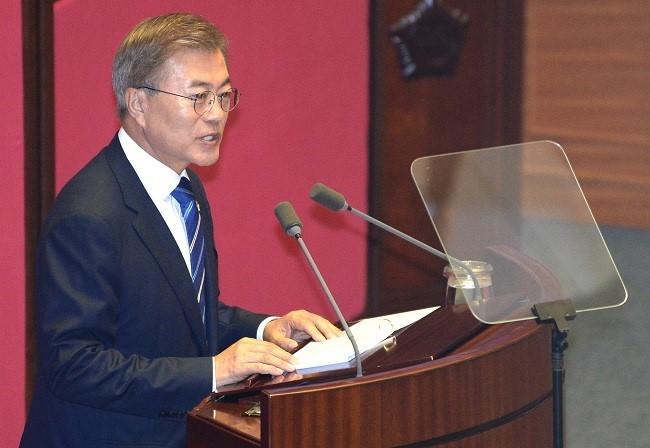Moon says N. Korean denuclearization matter of survival for S. Korea
By Sohn Ji-youngPublished : June 12, 2017 - 19:29
South Korean President Moon Jae-in vowed to work with Japanese and American leaders in completely ridding North Korea of nuclear weapons on Monday, calling it a way to ensure peace in the region and also his country's survival.
"North Korea's denuclearization is needed to ensure peace in the world and Northeast Asia, but for South Korea, it is a matter of survival," Moon said in a meeting with Toshihiro Nikai, a special envoy of Japanese Prime Minister Shinzo Abe.

Nikai, a lawmaker and secretary-general of Japan's ruling Liberal Democratic Party, was returning a visit by Moon's special envoy to Japan.
Seoul's presidential office Cheong Wa Dae said the Japanese envoy carried a letter from the Japanese leader, who stressed a need to keep the pressure and international sanctions on Pyongyang until the communist state completely abandoned its nuclear ambitions.
Moon agreed on the need to keep the pressure on, but also pointed to a need to bring North Korea back to the dialogue table, according to Park Soo-hyun, his spokesman.
"President Moon said because it will not end with only pressure and sanctions, we must bring North Korea back to the negotiating table before we can completely denuclearize the North," Park told a press briefing.
"While keeping up our pressure and sanctions, we also need to send a message at the same time that we will help once the North gives up nukes," Moon added, according to Park.
In his letter to Moon, the Japanese premier also discussed a recent controversy over a 2015 agreement between the two countries over Japan's sexual slavery of Korean women during World War II, according to the Cheong Wa Dae spokesman.
President Moon reiterated his earlier stance that most of his people simply could not accept the deal signed by Seoul's former conservative government, ousted over a range of corruption allegations involving former President Park Geun-hye.
"Most of all, the former sex slaves themselves refuse to accept the deal," the president told Nikai.
Tokyo insists the 2015 agreement was designed to settle the thorny issue once and for all, but many South Koreans, apparently including the new South Korean president, believe the deal must be renegotiated.
Moon has specifically stressed a need to, at least, renegotiate the terms of the agreement.
The controversial deal requires Tokyo to provide 10 billion yen, or mere $9 million, not even in compensation, but in support funds for thousands and thousands of Korean women forced to work as sex slaves for the Japanese military until the end of World War II in 1945.
"The reality is that most South Koreans cannot accept the deal. There is a need to look squarely at the issue and realize that we need more time," Moon was quoted as saying.
Still, the South Korean president said the history issue must not hinder the countries' relations, especially in dealing with other issues that require their joint efforts, such as the North Korean nuclear issue.
"We cannot have this issue prevent other issues from moving forward. Other issues must move forward," he said, according to his spokesman. (Yonhap)




![[Herald Interview] 'Amid aging population, Korea to invite more young professionals from overseas'](http://res.heraldm.com/phpwas/restmb_idxmake.php?idx=644&simg=/content/image/2024/04/24/20240424050844_0.jpg&u=20240424200058)











![[KH Explains] Korean shipbuilding stocks rally: Real growth or bubble?](http://res.heraldm.com/phpwas/restmb_idxmake.php?idx=652&simg=/content/image/2024/04/25/20240425050656_0.jpg&u=)

